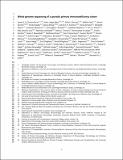Files in this item
Whole-genome sequencing of a sporadic primary immunodeficiency cohort
Item metadata
| dc.contributor.author | Primary Immunodeficiency Consortium for the NIHR Bioresource | |
| dc.contributor.author | Lynch, Andy G. | |
| dc.date.accessioned | 2020-11-06T00:38:38Z | |
| dc.date.available | 2020-11-06T00:38:38Z | |
| dc.date.issued | 2020-05-06 | |
| dc.identifier | 268385038 | |
| dc.identifier | da344e20-2ea5-480d-8f8e-30ef627e68c1 | |
| dc.identifier | 85085120745 | |
| dc.identifier | 000606430300001 | |
| dc.identifier.citation | Primary Immunodeficiency Consortium for the NIHR Bioresource & Lynch , A G 2020 , ' Whole-genome sequencing of a sporadic primary immunodeficiency cohort ' , Nature . https://doi.org/10.1038/s41586-020-2265-1 | en |
| dc.identifier.issn | 0028-0836 | |
| dc.identifier.other | ORCID: /0000-0002-7876-7338/work/75610479 | |
| dc.identifier.uri | https://hdl.handle.net/10023/20913 | |
| dc.description | Funding: E.D.T. is supported by the Medical Research Council (MRC) (RG95376 and MR/L006197/1); A.J.T. is supported by the Wellcome Trust (104807/Z/14/Z) and the NIHR Biomedical Research Centre at Great Ormond Street Hospital for Children NHS Foundation Trust and University College London; K.G.C.S. is supported by the MRC (programme grant MR/L019027) and is a Wellcome Investigator; A.J.C. was supported by the Wellcome Trust (091157/Z/10/Z, 107212/Z/15/Z, 100140/Z/12/Z, 203141/Z/16/Z), JDRF (9-2011-253, 5-SRA-2015-130-A-N), NIHR Oxford Biomedical Research Centre and NIHR Cambridge Biomedical Research Centre; E.E. has received funding from the European Union Seventh Framework Programme (FP7-PEOPLE-2013-COFUND) under grant agreement number 609020- Scientia Fellows; E.R. is supported by the Wellcome Trust (201250/Z/16/Z); D.E. is supported by the German Federal Ministry of Education and Research (BMBF) within the framework of the e:Med research and funding concept (SysInflame grant 01ZX1306A; GB-XMAP grant 01ZX1709) and funded by the Deutsche Forschungsgemeinschaft (DFG; German Research Foundation) under Germany’s Excellence Strategy (EXC 2167-390884018). | en |
| dc.description.abstract | Primary immunodeficiency (PID) is characterized by recurrent and often life-threatening infections, autoimmunity and cancer, and it poses major diagnostic and therapeutic challenges. Although the most severe forms of PID are identified in early childhood, most patients present in adulthood, typically with no apparent family history and a variable clinical phenotype of widespread immune dysregulation: about 25% of patients have autoimmune disease, allergy is prevalent and up to 10% develop lymphoid malignancies1–3. Consequently, in sporadic (or non-familial) PID genetic diagnosis is difficult and the role of genetics is not well defined. Here we address these challenges by performing whole-genome sequencing in a large PID cohort of 1,318 participants. An analysis of the coding regions of the genome in 886 index cases of PID found that disease-causing mutations in known genes that are implicated in monogenic PID occurred in 10.3% of these patients, and a Bayesian approach (BeviMed4) identified multiple new candidate PID-associated genes, including IVNS1ABP. We also examined the noncoding genome, and found deletions in regulatory regions that contribute to disease causation. In addition, we used a genome-wide association study to identify loci that are associated with PID, and found evidence for the colocalization of—and interplay between—novel high-penetrance monogenic variants and common variants (at the PTPN2 and SOCS1 loci). This begins to explain the contribution of common variants to the variable penetrance and phenotypic complexity that are observed in PID. Thus, using a cohort-based whole-genome-sequencing approach in the diagnosis of PID can increase diagnostic yield and further our understanding of the key pathways that influence immune responsiveness in humans. | |
| dc.format.extent | 10195094 | |
| dc.language.iso | eng | |
| dc.relation.ispartof | Nature | en |
| dc.subject | QH426 Genetics | en |
| dc.subject | QR180 Immunology | en |
| dc.subject | DAS | en |
| dc.subject | SDG 3 - Good Health and Well-being | en |
| dc.subject.lcc | QH426 | en |
| dc.subject.lcc | QR180 | en |
| dc.title | Whole-genome sequencing of a sporadic primary immunodeficiency cohort | en |
| dc.type | Journal article | en |
| dc.contributor.institution | University of St Andrews. School of Medicine | en |
| dc.contributor.institution | University of St Andrews. Statistics | en |
| dc.contributor.institution | University of St Andrews. Sir James Mackenzie Institute for Early Diagnosis | en |
| dc.contributor.institution | University of St Andrews. Cellular Medicine Division | en |
| dc.identifier.doi | https://doi.org/10.1038/s41586-020-2265-1 | |
| dc.description.status | Peer reviewed | en |
| dc.date.embargoedUntil | 2020-11-06 |
This item appears in the following Collection(s)
Items in the St Andrews Research Repository are protected by copyright, with all rights reserved, unless otherwise indicated.

